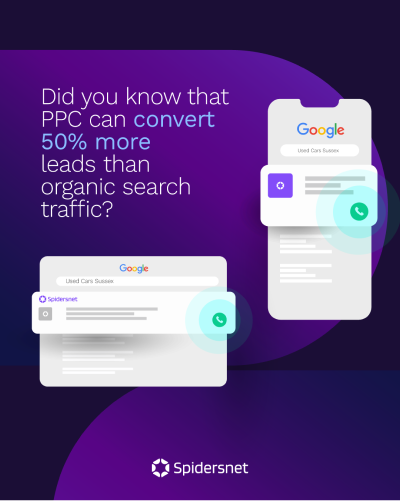Pay Per Click (PPC) for car dealers is a critical tool to have in your marketing arsenal. Here we will outline what PPC is, how it works and why it is such a useful tool.
It’s worth mentioning that here at Spidersnet we also offer a PPC package, where we can carry out the campaign work for you, reporting back our results at the end of each month. For more information on this, click here now.
What is PPC?
PPC stands for Pay Per Click. This is the all-encompassing term for online paid advertising, and will typically charge you every time your site receives a click. Ads can appear on a search engine results page (SERP) or on other websites, depending on the type of campaign you choose to run – more on that later.
Google has the biggest and most popular PPC offering, known as Google Ads, which includes a network of over 2 million websites reaching 90% of all people using the internet. Bing also offers PPC, known as Bing Ads, and works in partnership with Yahoo to supply ads to their search engine.
64% of users in the UK have clicked on a Google ad

Ads on SERPs
When you carry out a search on any search engine, you are presented with a number of results. The first three or four results are typically PPC ads with the rest being primarily organic results.
Google search results
Google PPC ads are the first three to four ads which appear at the top of the SERP (search engine results page), above the local results and the organic listings. Google is constantly tweaking the way ads are differentiated in search results, but they will also be marked as an ‘Ad’ on the listing.
Bing search results
Similarly, Bing features four ads above the organic listings in their SERP, but they also feature ads in the right hand column. Yahoo follow the same layout as Bing when it comes to their PPC ads.
Display Advertising
PPC also includes a form of advertising known as display advertising. Have you ever visited a website and noticed a banner showing the latest BMW model for sale? This is a form of display advertising. It includes any banner on a site which advertise the product of another site.
Each time a user clicks an ad the advertiser pays the advertising network and they, in turn, pay the owner of the website a small fee.
Why is PPC important for car dealerships
According to Zenith’s Advertising Expenditure Forecasts, online advertising has now overtaken TV advertising to become the world’s biggest advertising platform.
Businesses, including car dealerships and marketplaces are using online advertising to find and target potential customers. PPC gives you the opportunity to do that – to ensure that your ads appear higher than your competitors and, ultimately, win clicks over your competitors. Utilising PPC gives you the chance to keep up.
Automotive ads receive an 2.14% average CTR, which is above the average 1.91% for all industries

Benefits of PPC
The average UK adult spends as much as 6 hours a day online. Using PPC you can run a highly targeted campaign, within a specified budget so you can control exactly who you want to see your ads and how much you are spending to get in front of your audience. Most importantly it is easy to track the performance of your ads and see what is working and driving you towards your goals.
We love PPC for car dealers because:
- You target people looking for your services – using relevant, traffic driving keywords you can create ads crafted to appeal to people who are already looking for your services, from used cars for sale through to car servicing. You can get really specific about who you want to serve your ads to, determining things such as location, time and device.
- You only pay for those who are genuinely interested – because of the PPC model as an online advertiser you will only ever pay when someone clicks on your advert. They will have clicked because they’ve seen or read something in your ad copy which has caught their attention, or met the needs of their search. So unlike radio or TV advertising you know they are going to be genuinely interested in what you have to offer and therefore much more likely to convert into a paying customer.
- Results can be seen quickly – unlike SEO, which is a long-term digital marketing strategy, PPC can be live almost instantly. Once the ads have been approved, they will then be live and you will begin to see the impressions and clicks rolling in. This is also a bonus when it comes to making changes, for example, if you want to test out a new way of wording an advert this can be updated straight away.
- Everything is measurable – online advertising has grown to become the biggest advertising platform because, unlike TV or radio advertising, everything is measurable. Each platform provides up-to-the-minute data, recording how many people have seen your ads (impressions), how many people have clicked on your ads (clicks) and how many people have converted through your advertising campaign (this varies depending on your goals, but can include calls made from the advert or contact forms submitted).
Google PPC Ads vs Google Vehicle Ads
With PPC ads, you can select keywords relevant to your industry using the keyword planner, then you create an advert based on the keywords and specify the maximum you’re willing to pay for each click, known as your cost per click (CPC). Once Google has approved your ads they will begin to appear each time a user carries out a search relevant to the ad.
Google Vehicle Ads are the latest addition to Google’s advertising repertoire. Appearing at the top of SERPs, instead of being marked as ‘ad’ in the results, they function more like a shopping ad. These show when specific related searches are carried out for example ‘used BMW near me’, and allow images, prices, stock levels and other key information show as part of the ad on the SERP.

How do they choose which ad ranks where?
It’s more than likely that, once you’ve chosen your keywords, you’ll find other companies are also paying to appear for those keywords too – so how does Google pick which ads to rank and where? You might be surprised to find that trying to pay more than your competitor won’t necessarily mean your ad appears above theirs.
To determine which order ads should appear for a search term Google uses a couple of quality control metrics. The first is your ‘quality score’, which is based on click-through rate (CTR), ad and keyword relevance, and landing page relevance. If your quality score is low because your ad copy isn’t relevant to the search term and your landing page experience is bad, then you could be paying a higher CPC than your competitors and still not appear above them. This is because of Google’s ‘ad rank’ metric, which is calculated using the quality score times the max CPC. It’s your ad rank that Google uses a determine where the ad should rank in relation to your competitors.
So if you need to outrank a competitor it won’t just be your CPC bid which is playing a part, you also need to consider whether the quality of your ads or landing page could be improved.
Let us take care of your marketing
So there you have it, our guide to PPC. Here at Spidersnet we also offer a PPC package where we can carry out all of the PPC campaign work for you, reporting back your results at the end of each month. If you have any questions about this topic then don’t hesitate to get in touch.
